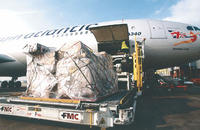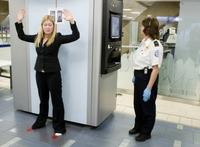-
Airport screening specialist Reveal Imaging acquired by SAIC
SAIC acquires Reveal Imaging Technologies of Bedford, Massachusetts; Reveal was founded in 2002 in response to the U.S. government’s mandate for aviation security screening after the attacks of 9/11. The company has developed imaging technologies for screening airport baggage and detecting explosives in checked luggage
-
-
New explosives detection technologies show promise
An adversary who is willing to die trying to carry out a mission is one of the reasons why more conventional security organizations find it so difficult to pursue their protection mission effectively in an asymmetrical war — the kind of war terrorists engage in; new explosive detection technologies may be of help
-
-
Better to teach old dogs new tricks
DHS recently announced that it wants to buy 3,000 dogs from breeders — at a cost of $4,535 per dog — to increase its force of canines who sniff out explosives, cash, and drugs; since only 20 percent of dogs who are selected for service programs successfully complete the training process, this plan will actually result in breeding 15,000 dogs, of which 12,000 will end up in shelters; one expert offers an alternative: DHS should follow the lead of the Hearing Ear Dog Program and many police departments and fill its ranks with dogs adopted from shelters
-
-
Detecting sticky bombs
Sticky bombs — explosives affixed to a car, which explode when you turn the ignition key — as the stuff of movies dealing with the Mafia, but terrorists used them as well (as do the secret services of some countries); researchers at Argonne National Laboratory offer a way to detect surreptitiously placed sticky bombs
-
-
New radiation mechanism may ward off oil spills, terrorism
New radiation mechanism in the terahertz range could be used to destroy cancer cells, track miniscule traces of explosives hidden under clothing, and trace and potentially destroy specific chemicals that damage the environment and our bodies
-
-
TSA wants more bomb-sniffing dogs to protect air, ground travelers
The Transportation Security Administration (TSA) wants to increase the role dogs play in sniffing out terror threats at U.S. airports and other mass transit systems; TSA requested $71 million from Congress to train and deploy 275 explosives detection canine teams — bomb dogs and their handlers — at transportation facilities
-
-
TSA will miss 1 August air cargo screening deadline

TSA will miss the congressionally mandated 1 August deadline of having 100 percent of cargo carried on planes screened; all cargo loaded onto passenger planes departing from domestic airports will be checked for explosives by the deadline, but screening all international cargo entering the United States has proved more challenging; the reason: an estimated 2.8 billion pounds of air cargo arrives in the United States every year on passenger aircraft from 94 different countries; the cargo is handled in the global air cargo supply chain by a vast number of participants; each of these 94 countries has unique air cargo security programs and regulatory requirements, many of which differ significantly from those required by TSA
-
-
Scientists: Full-body scanners' radiation underestimated, could pose cancer risk
More and more scientists express their unease with the amount of radiation to which passengers are exposed as they are screened by full-body scanners at airports; experts say radiation from the scanners has been underestimated and could be particularly risky for children; they say that the low level beam does deliver a small dose of radiation to the body, but because the beam concentrates on the skin — one of the most radiation-sensitive organs of the human body — that dose may be up to 20 times higher than first estimated
-
-
Airport security is big business, and Rapiscan Systems benefits
Airport security is serious business and, increasingly, it is also big business; TSA plans to deploy as many as 1,800 full-body scanner at U.S. airports by the end of 2014; at $170,000 a scanner, this is a $300 million proposition
-
-
Would-be terrorists in U.S. hobbled by logistics
Explosives experts say there are many reasons for the string of bomb failures in recent attempts by would-be terrorists in the United States; among them: it is hard to get explosive materials in the United States; putting together a bomb is a complicated process; and these kinds of attacks require a team to get them off the ground
-
-
Landmine detector made from off-the-shelf components
Researchers in the United States have developed a low-cost technology to detect landmines using a novel acoustic/microwave system; the system, made from off-the-shelf components, costs about $10,000. This compares to laser-based Doppler remote detection systems that sells for upwards of $1 million
-
-
EU supports full-body scanners, but says common standards for privacy, health are needed

An EC report says that full-body scanning at airports makes a contribution to security, but that a common framework must be developed across the European Union to protect citizens’ fundamental rights and health
-
-
RadPRO SecurPASS from Virtual Imaging
As worries about security increase, more venues require employees, customers, and visitors to pass through security scans; the scanning machines at the growing number of security check-points must meet two criteria: they should be able to detect a wide variety of materials and objects, and should do so at the lowest radiation dose possible; Virtual Imaging, a wholly owned subsidiary of Canon U.S.A., Inc., says its RadPRO SecurPASS meets these two criteria
-
-
New questions raised about full-body scanners
Aviation security experts say the machines may miss items that metal detectors catch; airline passengers may also be able to hide materials in the groin or body cavities; critics do not dispute that the imaging technology is superior to metal detectors at finding hidden nonmetallic objects, but some say it should be used only in conjunction with metal detectors and other technologies
-
-
U.K. police raids companies selling explosives "divining rods"
A British company made millions of dollars selling hand-held explosives “divining rods” to Iraqi security forces; despite scientific evidence that the device was a hoax., the Iraqi army and police kept using millions in U.S. aid dollars to buy the worthless gimmick and equip check-point personnel with it; in February the British government banned the production and sale of the device, and last week the police raided three companies for exporting fake bomb detectors
-
More headlines
The long view
Prototype Self-Service Screening System Unveiled
TSA and DHS S&T unveiled a prototype checkpoint technology, the self-service screening system, at Harry Reid International Airport (LAS) in Las Vegas, NV. The aim is to provide a near self-sufficient passenger screening process while enabling passengers to directly receive on-person alarm information and allow for the passenger self-resolution of those alarms.
